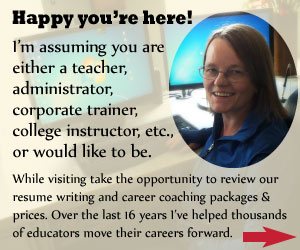Effective e-Learning Teacher Job Search Methods
Effective e-Learning Teacher Job Search Methods
Technology is the way of the future (and the present), and so is e-learning. As online education becomes more popular, you will see a sharp rise in job opportunities for e-learning teachers. A job search for e-learning instructors can be conducted the same way a search would be done for classroom teachers. One thing to examine is how you are searching? What words are you using? E-learning can be referred to in various terms:
- E-learning (of course)
- Distance Education
- Distance Teaching
- Distance Learning
- Online Education
- Online Teaching
- Online Learning
- Online Adjunct Jobs
- Virtual Schools

It is possible that each school district will use a different term to describe e-learning. Therefore, it is crucial you incorporate the above phrases when looking online. You don’t want to miss out on an opportunity simply because you chose the wrong phrase. The above list isn’t exhaustive either, but it’s a good start when typing a job search into Google or a job search website. You will also want to use different terms for the profession:
- Teacher
- Instructor
- Educator
- Tutor
- Professor
Maximizing job search results is all about the utilization of keywords – whether incorporating them in your online search, or implementing them in your teacher resume. The latter is particularly crucial if you submit your resume online and it ends up being scanned on the other end. You must use keywords if you want your job application document to make it to human eyes. In addition to the first set of words, some key terms you may want to integrate in your e-learning resume include:
- Technology Integration
- Individualized Instruction
- Student Assessment
- Curriculum Development or Design
- Curriculum Planning
- Teacher-Parent Relations
- Parental Involvement
- Special Needs Students
- Gifted/Talented Students
- Student Involvement
- Teaching Across the Curriculum
- Interdisciplinary or Multidisciplinary Teaching Approaches
- Brain-Based Learning
As the first item on the list indicates, technology integration is absolutely crucial to e-learning; without technology it wouldn’t exist! You must know how to design and present electronic lesson plans, assign activities digitally, administer online student assessments, and maintain communication with pupils. Below are various programs and websites you should familiarize yourself with if you haven’t already. Incorporate these platforms in your resume, search for jobs using these terms, and showcase your expertise in them when advertising your job search online.
- Khan Academy
- TED-Ed
- Edmodo
- Edutopia
- Socrative
- EduBlogs
When embarking on a new job search, it is important you let your contacts know you are looking. However, if your current employer doesn’t know you are looking at a new teaching position, you may want to keep your search relatively quiet, so as not to jeopardize your current job. If you are unemployed though, or your employer knows you are leaving, let family, friends, and close colleagues know you are pursuing other options. The more people that know, the better. Networking is one of the most proven methods for discovering job openings and getting an edgeover the competition. You should also check online teaching websites, job boards, and e-learning forums to find potential positions. Teacher job fairs are another great place to uncover present or future openings, as well as discover what each district is looking for in an online educator.
Social media is also playing an increasing role in the e-learning teacher job search. Utilize Twitter, LinkedIn, and Facebook to hunt for jobs, display your outstanding skills, and make new contacts. Make sure you keep your social media pages clean and professional. This may be the first impression you make on a potential employer, so make sure it’s a good one! When developing a LinkedIn page, the goal is to market yourself as an excellent online instructor, and leave the hiring administrator wanting to learn more. Here are some quick steps to creating a high-traffic onlineeducator profile:
- List your education, experience, and skills
- Post a professional looking photo
- Utilize education-specific keywords and e-learning phrases to grab the reader’s attention
- Make your headline pop
- Explain uncommon acronyms or terms that only industry-specific people would recognize
- Use your profile to make job responsibilities and accomplishments stand out
- Proofread your entire profile
- Start networking!
If you’re incorporating Twitter as part of your job search, use your city’s hashtag to search for job openings in your area. Other hashtags such as #jobhunt, #jobsearch, #hireme, #hiremenow, #dreamjob, or #hotjobs can help you track down the ideal job opening. Some examples of teacher and tech related hashtags are #edchat, #ntchat, #PLN, #edbeat, and #edtech. If Facebook is part of your job search campaign, keep your page employer-friendly, i.e. no lewd images or coarse language, political or religious comments, negative posts about current or former employers, or anything else that mayturn off a hiring administrator.
One final note – make sure your resume is up-to-date and proofread before you submit it to any job opening. Your e-learning resume should be updated, easy to read, professional looking, and highlight your exceptional skills and job accomplishments. In addition, your online educator cover letter should be tailored toward the school or district you are applying to. You must address their unique goals, needs, and mission statement, and demonstrate how you are able to help them fulfill their philosophy. Use your cover letter to market yourself and encourage the reader to pick up your resume and offer you a job interview. And don’t forget to use those e-learning keywords!

